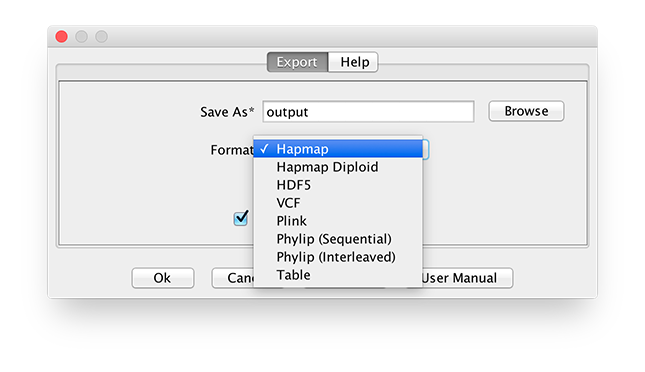Phylip Software Package
| Get me PHYLIP now |
PHYLIP package starting with version 4.0a. This is the source code for PHYLIP v4.0. The PHYLogeny Inference Package (PHYLIP) is a package of programs for inferring evolutionary trees (phylogenies). Methods that are available in the package include parsimony, distance matrix, and likelihood methods, including bootstrapping and consensus trees. /usr/local/packages; Software packages installed under /usr/local/packages can be accessed by all users. It is suitable for software packages that will be used by users from multiple research groups. This type of request must be sent by the PI of a research group. H3 How to request. Please send an email to sys-help@loni.org with the following.
Note -- you probably need the full PHYLIP package, includingthe source code and documents in some form, simply in orderto make sure that you have the documentation, even if you do not intend to ever recompile the sourcecode. Most Windows and MacOS users will want to use theexecutables for theirmachines and will not need to recompile the source code,but everyone will need the documentation as well. Whenever PHYLIPis packaged as a single archive, it does include the all of thesource code and documentation.
The Windows executables, documents, and sourcesare in the form of a Zip archive. To extract it,put it in a directory by itself and right-click on theicon of the archive. You will then be given the option to unpack the archiveinto the many files of the package.
The Mac OS X package is distributed as a .dmg Disk Image whichcan be unpacked using the instructions on our installation web page.The Linux executables can easily be compiledafter downloading the source code -- see the installation page here.
| What to do |
Phylip Tree
First note that at the bottom of this page is a link to registeryour copy of PHYLIP, and also a link to installation instructions.To transfer the files,click on the appropriate links below. Then register, and read theinstallation instructions and follow them.
| 1. Fetch the following: |
| PHYLIP's license is changing to an open-source license. Itnow uses a license that allows re-use in other software packages withoutdemanding a royalty. (It does not demand that all other software in thatdistribution be open-source). The source code tar archive below has the newlicense. I have designated it as a new version, 3.698. |
Linux or Unix
For Linux or Unix (or other systems that need to compile from source code):
(see below for information on how to compile these, and forinformation on precompiled Linux and Unix executables).Windows

We have here the PHYLIP package for Windows, which works onall versions of Windows from Windows 3.1 to Windows 10.Executables, documentation files, andsource code is included in this distribution.
PHYLIP for Windows is available here in two forms. You willneed only one of these, so read carefully before downloading. If youclick on one of these selections to download it, make sure your browsersaves it to disk. Afterdownloading, but before you do anythingelse, you should readour installation instructions.If you have a recent Windows system that is able to extract a ZIPthat file, and if you can transfer a file that is about 12 megabytes in size, you will want to download thiszip archive, and then right-click on it to see an option to unzip thearchive.

- If you have (as most people do) a 64-bit Windows system, use this Zip archive: Zip archive of PHYLIP 3.698 for Windows.
- If you have an older Windows system that is a 32-bit system,
thenyou will need to use this older version that was compiled for 32-bit systems: Zip archive of PHYLIP 3.695 for Windows.
Mac OS
For Macintosh Mac OS (either Intel iMac or PowerMac) the package is distributed as a single compresseddisk image (.DMG) file of 12 Megabytes. Click on this link to download it:
Phylip Software Packages
After PHYLIP is installed, the most recent Mac OS X operating system versions,from Mountain Lion on, may refuse to run its executables when you click on the programicon. There is a good workaround for this -- see the discussion atourinstallation web page.
| 2. Register your copy |
(It is not necessary to register separately for each file transferred -- youcan register once after downloading several files).
| 3. Install PHYLIP |
| Precompiled executables available elsewhere |

Debian linux executables
Andreas Tille and Manuel Prinz have compiled and made available a set of PHYLIP3.695 executables for Debian Linux.These are in the 'unstable' section of Debian packagesand may be downloaded for free ('free in the sense of free beer') fromits page on the Debian web site athttp://packages.debian.org/unstable/science/phylip.or from various Debian mirror sites. Of course, one can also installthe source code (see under Unix above) and compile it yourself.
Executables for FreeBSD
Phylip Software Package Insert
A PHYLIP 3.695 package for FreeBSD Unix is available, thanks to David Baderand others. It is located atthe BSD PHYLIP package web page athttp://www.freebsd.org/cgi/cvsweb.cgi/ports/biology/phylip/.
Phylip Package Software
| Specialized source code versions available elsewhere |

Phylip File
Source distribution for NetBSD
A set of sources and executables for PHYLIP 3.69 forthe NetBSD operating system has been produced (originally by Marc Baudoin). They are available fromThe NetBSD Packages Collection PHYLIP page athttp://ftp.netbsd.org/pub/pkgsrc/current/pkgsrc/biology/phylip/README.html
